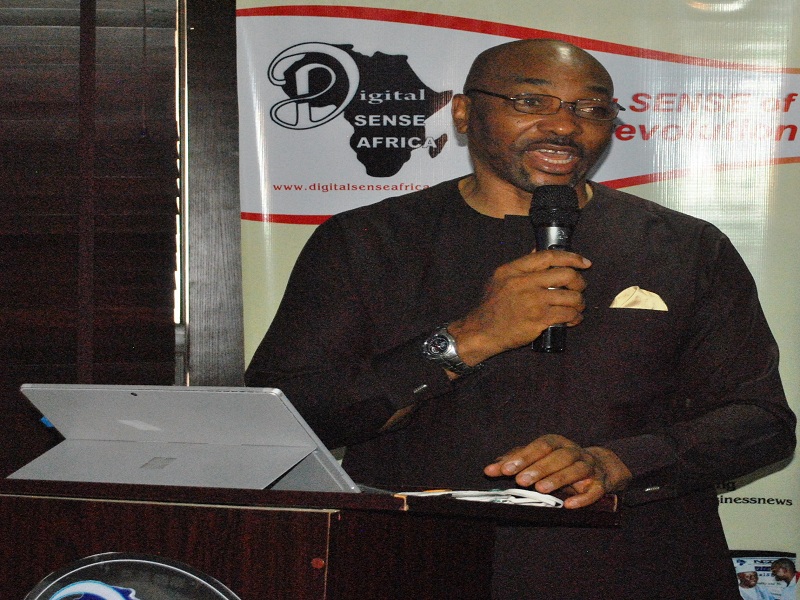Telecom
NDSF2021: Nothing Surpasses Internet in Human Transformation says Mba-Uzoukwu

Mr. Chinenye Mba-Uzoukwu, President of the Institute of Software Practitioners of Nigeria (ISPON) has described the Internet as a leveler for education and prosperity in a digital economy, even as software Nigeria has the key and capacity to contribute to national development.

Mba-Uzoukwu made this known in his keynote address to the 2021 Nigeria DigitalSENSE Forum on Internet Governance for Development (IG4D) held at the Golden Tulip Essential Hotel, International Airport Road, Lagos on Thursday, June 10, and chaired by the President, Nigeria Computer Society (NCS), Prof. Adesina Sodiya, who was represented by Dr. Olusoji Okunoye, with the theme: Digital Cooperation: Enhancing Multistakeholder Governance for Digital Economy.
ISPON president who dwelt on “Role of Nigerian Software in Enhancing Governance in Digital Economy,” noted that there is nothing in human history as transformative as the Internet, because it has largely changed everything and outlined some of these epochal changes to include the potential to level the playing field, namely education, healthcare, prosperity, lifestyle and well-being.
He also pointed out how humanity got here was not a stand-alone, hence the imperative to recognize an ‘ecosystem’ in the technology space that is systemic in outlook. Highlighting that in technology, the most intriguing ecosystem is the innovation ecosystem, a “human network that generates extraordinary creativity and output on a sustainable basis.”
Such an ecosystem, Mba-Uzoukwu said, performs best when it recognizes, synergizes and optimizes on the basis of a multi-stakeholder approach that accommodates the complexity of the ecosystem which creates dimensions of impact that make governance an intentional mandate.
“Existence of telecommunication infrastructure, the first precondition to overcome the digital divide; Current economic models for Internet access, place a disproportionate burden on developing countries, Challenges to financing access to backbones, ‘Free-rides’ of Over-The-Top services and challenges of balancing their contributions to telecom sectors of developing countries based on issues of taxation,” he said.
For instance, he said, global regulation of intellectual property rights paved the way for developing countries to access knowledge and information online, which led to enthronement of “Truly, ‘Education For All’ for the first time in human history,” which avails developing countries to catch up, and this is the single most important factor.
This factor, he also said, encouraged ISPON to dare to dream again, which underscored the group’s answer in envisioning growth of Software Nigeria into a world-class industry, and a key contributor to national development.
To realise this, ISPON President revealed, they planned to sensitize the community about the local software industry; provide fora to share software development initiatives; aggressively support the expansion of Nigeria’s human capital, foster co-operation with Nigeria IT in diaspora; cooperate with other countries to boost global exposure and competitiveness.
At the policy level, Mba-Uzoukwu said that the government, industry and academia, must continue to drive the evolution of policy across multiple dimensions including national security, intellectual property and privacy rights, education, information access and data sovereignty.
Education, for instance, he said, must be harnessed with the national aspirations to the potentials of technology for powering the pragmatic development of world-class, innovation cum oriented and entrepreneurial work force. He emphasized that employment and entrepreneurship must deploy technology in support of the genuine aspirations of Nigerian youth.
“Beginning with the National Association of Computer Science Students (NACOSS), we will create and expose opportunities for jobs and wealth creation through personal enterprise,” he declared.
Further, ISPON President said that by nurturing innovation as a national capability, “we must be the advocates and a platform for unleashing creativity and ingenuity of our people, particularly the youth and women whose access to opportunity are hindered.”
Mba-Uzoukwu underscored the fact that to achieve the World Summit on the Information Society, there is need for a common vision, desire and commitment to build a people-centric, inclusive and development-oriented Information society where everyone can create, access, utilize and share information.
He cautioned that the implication of non-alignment to the above common vision, the concepts of social justice, merit and asynchronous development will not be part of its main drivers.
He noted that with the rapid diffusion of technology, “we must encourage a bridge-building, inclusive and partnering approach to community that embraces and empowers the youth, women and leverages on the experience of the elders.”
NDSF2021 witnessed other speakers including the Managing Director of the Nigerian Communications Satellite (NigComSAT), Dr. Abimbola Alale who was represented by the Acting Manager Marketing, Mrs Ibiye Ukoko, Mr. Aderemi Adejumo of CloudFlex, Mr. Mohammed Rudman represented by Mr. Jacob Dagunduro, Executive Director, Operations at DigitalSENSE Africa Mrs. Nkem Nweke, and Mr. Francis Uzor or Wisdom Computer Technologies, among others.
Telecom
Visa Launches Report on Digital Payment Landscape in Nigeria, Shows Positive Outlook

Visa, a global leader in payments, today announced the launch of a new report, ‘Value of Acceptance: Understanding the Digital Payment Landscape in Nigeria,’ which highlights substantial growth potential for digital payments, particularly among small and medium-sized enterprises (SMEs).

In Nigeria, digital payments are proving beneficial for surveyed SMEs, with nearly 90% believing that it boosts revenue and customer footfall. This growing confidence in digital transactions, especially cards, is coupled with a desire for further digitization, with 76% of cash-only SMEs planning to invest in new payment technologies.
The study also reveals that more than half of merchants already prefer digital payments, with 44% reporting lost sales due to customers’ lack of cash and 62% expressing concerns over fraud risk associated with cash.
Nigeria’s Digital Payments Momentum
An overwhelmingly positive outlook on digital payment investment emerged in the report, with 83% of merchants surveyed seeing this as a crucial component for growth, boosting sales, reducing fraud, and enhancing convenience among customers,
“Nigeria’s digital payments landscape is rapidly evolving, with a growing inclination towards digital transactions,” stated Andrew Uaboi, Vice President & Head, Visa West Africa.
“This transformation not only holds the promise of bolstering SMEs prosperity but can also help the economy to thrive.
“At Visa, we look forward to working together with our partners to further drive this transformation, enabling individuals, merchants, and businesses to grow and participate in the digital economy.”
Addressing Challenges to Unlock Full Potential
Unlocking digital payments’ full potential in Nigeria will require confronting key challenges. There is an overarching need to enhance financial literacy and raise awareness about the benefits of digital payments while also incentivizing their usage among customers.
With 76% of cash-only SMEs surveyed intending to get a point-of-sale (POS) device in the near future, an opportunity emerges to accelerate adoption through simplifying onboarding.
In addition, improving infrastructure to counteract concerns around payments failures (42%) can enhance confidence in digitization. To address fraud concerns, educational campaigns are vital to highlighting the robust security features of digital payments, especially the lower fraud risk associated with card payments.
Visa’s established cybersecurity capabilities can be instrumental to building trust across the digital payments landscape in Nigeria by helping to harness confidence across both the SME and consumer segments.
The Broader Value of Digital Payment Acceptance
Digital payments are crucial for Nigerian SMEs for a number of reasons including – boosting revenue through an increasingly cashless customer base, improving customer satisfaction with faster payments, and reducing operational risks by minimizing cash handling. Digital transaction records also provide valuable data that facilitate access to financing and stimulate growth.
While cash is still seen as quick and convenient, cards offer an advantage across expense tracking, spending encouragement, and enhanced security. Meanwhile, mobile and digital wallets offer an innovative and competitive edge. Promoting the adoption of preferred methods, particularly card payments, is crucial for driving growth.
Beyond direct benefits, digital payment adoption drives economic growth and financial inclusion, by connecting the unbanked to the formal financial system and enabling access to savings, credit, and insurance.
Research shows that the transition to the digital economy can generate 1-2% annual GDP growth; a mere 1% increase in card usage generates an average $67 billion annual increase in goods and services consumption across 70 countries and territories.
Visa: A Partner in Driving Digital Payment Adoption
Visa is uniquely positioned to support Nigeria’s transition to a more digital economy. As a trusted advisor and partner, Visa offers a range of capabilities to help governments, financial institutions, businesses, and technology providers enhance their digital payment acceptance maturity.
Visa’s suite of solutions includes programs for specific merchant segments, innovations like Tap to Phone, Contactless Payments and Click to Pay, and resources educating businesses about the benefits of digital payments.
About the Visa Value of Acceptance report
Visa’s ‘Value of Acceptance: Understanding the Digital Payment Landscape in Nigeria’ report, conducted by 4Sight Research & Analytics, examines the current state of digital payment acceptance, exploring both opportunities and challenges. The findings are based on face-to-face interviews with 250 SME owners/managers who are key decision-makers with respect to day-to-day business decisions.
Telecom
Gombe Commissioner of Police Visits GBB Command Centre, Strengthens Collaboration on ICT-Driven Security Solutions

Galaxy Backbone (GBB) Limited welcomed the newly appointed Commissioner of Police for Gombe State, CP Bello Yahaya, on a courtesy visit to its North East Regional Office and Safe City Emergency Command Centre.

This visit underscored the growing synergy between law enforcement and technology-driven solutions in strengthening security operations and fostering digital transformation in the region.
During the visit, CP Bello Yahaya was received by Mr. Ibrahim Bello, Regional Coordinator of GBB North East Regional Office, alongside key members of the GBB team.
The engagement provided a platform to explore strategic collaborations aimed at enhancing security infrastructure, digital transformation, and capacity-building initiatives for the Gombe State Police Command.
The Commissioner was taken on a guided tour of the Safe City Emergency Command Centre, a state-of-the-art facility that forms a critical part of the National Information and Communications Technology Infrastructure Backbone (NICTIB) project.
The centre plays a pivotal role in improving security architecture across Gombe State and the North East region, leveraging cutting-edge surveillance systems, real-time monitoring tools, and integrated emergency response mechanisms.
With its advanced Unified Communications System, security analytics, and digital emergency response coordination, the Safe City Command Centre provides law enforcement with real-time intelligence, proactive threat detection, and seamless inter-agency collaboration, enabling a more effective and responsive approach to public safety.
CP Bello Yahaya expressed keen interest in leveraging ICT solutions to strengthen policing efforts, emphasizing the importance of technology in modern crime prevention, data-driven policing, and crisis management.
He highlighted the need for enhanced digital transformation, improved connectivity, and expanded training programs to equip officers with the necessary skills to operate effectively in a digitally evolving security landscape.
Galaxy Backbone reaffirmed its commitment to supporting law enforcement agencies, government institutions, and critical stakeholders through innovative ICT solutions, secure cloud infrastructure, and digital training programs.
By providing access to high-speed connectivity, cybersecurity frameworks, and cloud-powered command centres, GBB continues to drive the adoption of smart policing solutions and enhanced security management across Nigeria.
The visit concluded with a shared commitment to deepening engagement between Galaxy Backbone and the Gombe State Police Command, focusing on optimizing digital transformation initiatives for law enforcement efficiency, expanding the scope of ICT-driven surveillance and emergency response systems and strengthening training programs for officers to enhance digital skills and operational effectiveness.
As Nigeria’s leading digital infrastructure provider, Galaxy Backbone continues to shape the future of public safety, digital governance, and cybersecurity, ensuring that law enforcement agencies have access to the best tools to protect lives and property.
Telecom
Salesforce Collaborates with Tech Leaders to Launch AI Energy Score for Model Efficiency

Salesforce, in collaboration with Hugging Face, Cohere, and Carnegie Mellon University, announced the release of the AI Energy Score, a first-of-its-kind benchmarking tool that lets AI developers and users evaluate, identify, and compare the energy consumption of AI models.

Salesforce also announced it will be the first AI model developer to disclose the energy efficiency data of its proprietary models under the new framework.
The AI Energy Score aims to address the lack of transparency about the environmental impact of AI models. Similar to how ENERGY STAR transformed energy efficiency standards for appliances and electronics, this initiative establishes a clear, trusted benchmark for AI model sustainability.
“Reducing AI energy consumption lowers operational costs, optimises infrastructure, and enhances long-term sustainability and profitability. We are proud to work with industry leaders to build a more transparent AI ecosystem,” says Linda Saunders, Salesforce Country Manager and Senior Director of Solution Engineering for Africa.
The AI Energy Score will debut at the AI Action Summit, where leaders from over 100 countries, the private sector, and civil society will convene to harness AI for good. By enhancing transparency, the score can drive market preference for efficient models and incentivise sustainable AI development. Recognised by the French Government and the Paris Peace Forum for its transformative potential, the AI Energy Score features:
Standardised Energy Ratings: A standardised framework for measuring and comparing AI model energy efficiency.
Public Leaderboard: A comprehensive leaderboard that features scores for 10 common AI tasks — such as text generation, image generation, and summarisation — performed by 166 models, including Salesforce’s SFR-Embedding, xLAM, and SF-TextBase.
Benchmarking Portal: A platform where AI developers can submit their open or proprietary AI models to be evaluated and added to the leaderboard. Open models can be automatically tested, while closed models can be evaluated through a secured testing sandbox.
Recognisable Energy Use Label: A new 1- to 5-star label that rates AI model energy use, with five stars indicating the highest efficiency. This helps developers and users easily identify and choose more sustainable models. Once rated, AI developers can generate standardised labels to share their models’ energy score, with built-in guidance on the proper label display for visibility and impact.
Last year, the company introduced Agentforce, the agentic layer of the Salesforce Platform for deploying autonomous AI agents across any business function. Agentforce offers tools to build and customise agents, as well as a library of ready-to-use skills for sales, service, marketing, commerce, Tableau, Slack, and more.

 E-Business3 days ago
E-Business3 days agoSchmidt, Ex Google Chief Says AI Risky in Terrorist Hands

 News3 days ago
News3 days agoFG Order MDAs to Close Commercial Banks’ Accounts, Enforce TSA Policy

 News2 days ago
News2 days agoTikTok Returns on Apple, Google US App Stores as Trump Delays Ban

 General News2 days ago
General News2 days agoResearchers Develop Innovative Treatment for Malaria

 E-Financial3 days ago
E-Financial3 days agoNigeria Worst Hit by Crypto Currency Fraud

 Telecom3 days ago
Telecom3 days agoSalesforce Collaborates with Tech Leaders to Launch AI Energy Score for Model Efficiency

 Telecom3 days ago
Telecom3 days agoGombe Commissioner of Police Visits GBB Command Centre, Strengthens Collaboration on ICT-Driven Security Solutions

 Telecom2 days ago
Telecom2 days agoVisa Launches Report on Digital Payment Landscape in Nigeria, Shows Positive Outlook

























